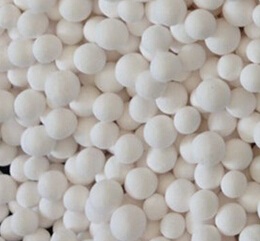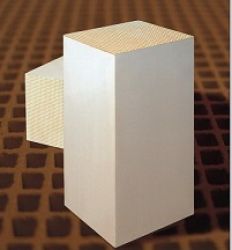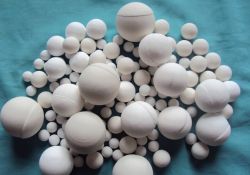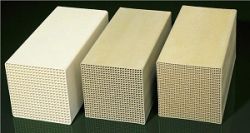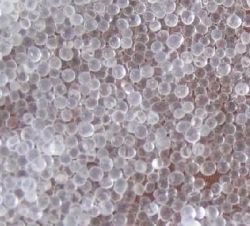Offer Yuanying Activated Alumina
| Price : | $1000.00 |
| Quantity : | 500 (metric ton) |
| Minimum Order : | 1 |
| Product Status : | New |
| Sample Available : | yes |
| Shipment Terms : | fob,cfr,cif,Negotiable |
| Payment Mode : |
T/T,L/C |
| Categories : | Chemicals, Chemical Auxiliary & Catalyst, Desiccant & Sorbent |
| Posted By : | Yuanying Industry Limited |
Description
| pore volume | 0.45 |
Activated Alumina 
Activated alumina is white spherical porous granules, smooth surface, uniform particle size, non-toxic, odorless, tasteless, insoluble in water, alcohol and organic solvents, but insoluble in acids and alkalis.
Yuanying activated alumina has strong moisture adsorption, high mechanical strength, big specific surface area, large pore volume, high pressure-resistant, high wear-resistant, stable chemical properties, not burst after absorbing water
There are the following types of products: activated alumina desiccant, activated alumina defluorination agent, activated alumina catalyst carrier, activated alumina for hydrogen peroxide, activated alumina sulfur recovery catalyst, potassium permanganate activated alumina, activated alumina dechlorination agent.
Activated Alumina Desiccant 
Yuanying activated alumina desiccant has advantages such as stable chemical properties, good adsorption capacity, high pressure-resistant, high wear-resistant, etc.
Widely used in petrochemical gas and liquid drying, food, oxygen industry, textile industry, electronic industry, air filter, air compressor and automated instrument drying.
Activated alumina desiccant is white spherical porous granules, surface smooth, uniform particle size, non-toxic, odorless, tasteless, insoluble in water, alcohol and organic solvents, but insoluble in acids and alkalis. It has strong moisture adsorption, does not burst after absorbing water, possesses big mechanical strength, specific surface area and pore volume.
Due to the unique porous bone structure, high specific surface area and in an unstable transition state, activated alumina desiccant has biggish activity, strong affinity with active ingredient. It has a number of capillary channels, its selective adsorption is not only determined by its micro-holes diameter size, but also according to the polarity of the adsorbed materials. Activated alumina desiccant has a strong affinity to water, acetic acid, alkali, etc., is a micro-water depth desiccant also is the adsorbent of polar molecules. Its monomolecular adsorption layer has high net heat quantity, is very suitable for non-heat regenerative device (pressure swing adsorption device), its dew point temperature is below -70 ℃ and is a highly efficient desiccant.
Activated Alumina Defluorinating Agent 
Yuanying activated alumina defluorinating agent has high defluorination capacity, and it is non-toxic, tasteless, odorless, insoluble in water and organic solvents.
Widely used for fluoride removal in high fluoride area, cyclic alkanes defluorinating agent among alkylbenzene production. This product can also be used for dearsenification, wastewater decolorizing, deodorizing, etc.
Activated alumina defluorinating agent is white spherical porous particles, uniform particle size, smooth surface, high mechanical strength, hygroscopicity strong, does not crack and inflate after absorbing water.
Fluorine is one of the trace element necessary for animal and human. Adult normal daily intake should be 2~3 mg, too much or too little can lead to disease, so defluorination is important in drinking water. Activated alumina has good strength, good abrasion resistance, long service life, stable performance, high defluorination capacity, after defluorination the water quality accords with national health standards, so activated alumina is one of the indispensable material in water treatment.
Activated alumina defluorinating agent has amphoteric adsorption properties, by regulating the PH value of aqueous solution, anions in aqueous solution can be detached. Defluorinating equipment is similar to ion exchanger, in order to obtain high defluorination capacity, need to lower PH value, while the PH value is 5.5, activated alumina adsorption rate of fluorine is the largest. In order to meet the quality requirement and control corrosion, PH values should be slightly acidic. Activated alumina defluorination is similar to the anion exchange resin, but the selectivity for fluoride ion is larger than the anion resin.
Smaller particle size can increase specific surface area, make a fully contact between activated alumina and water. For example, commonly used 1-3 mm, 0.4-1.2 mm, their specific surface area are generally more than 320 m2/g. High specific surface area means huge number of micropore, it can ensure a strong adsorption of fluoride ion in water. When raw water PH value and alkalinity is lower, defluorination capacity of activated alumina is higher, fluoride absorption of per cubic meter activated alumina is 6400 grams, fluoride absorption capacity is greater than 4.0mg/g, and the price is lower than synthetic resin.
Activated Alumina Catalyst Carrier 
Yuanying activated alumina catalyst carrier is a white, spherical porous material, non-toxic, odorless, not powdering, insoluble in water and alcohol. It has even micro-holes, appropriate aperture size, big pore volume, high water absorption, small bulk density, good mechanical properties, good stability, suitable for catalyst Carrier.
Application
(1) The Co-Mo sulfur-resistant shift catalysts produced by Activated alumina catalyst carrier has good low-temperature activity, width working temperature, short vulcanization time and other merits, it is applicable to small and medium sized ammonia factory.
(2) In the natural gas and petrochemical refining industrial process, to the hydrogen sulfide, can use activated alumina as catalyst for sulfur recovery.
(3) The most widely application for activated alumina catalyst carrier is hydrotreating, it can raise H/C ratio and get rid of O, S, N, finally can remove V, Ni and other contaminants.
(4) Another application for the activated alumina catalyst carrier is automobile exhaust catalyst, it can promote the oxidation of hydrocarbons, carbon monoxide and nitric oxide in exhaust gas, reduce air pollution.
(5) In the petroleum hydrocracking, hydrogenation refining, hydrogenation reforming, drogenation reaction and automobile exhaust purification process, activated alumina catalyst carrier plays an important role.
(6) Used for Alcohol dehydration, olefin isomerization, hydrogenation, oxidation and polymerization.
Alumina has been found to exist at least 8 form, they are α- Al2O3, θ-Al2O3, γ- Al2O3, δ- Al2O3, η- Al2O3, χ- Al2O3, κ- Al2O3 and ρ- Al2O3, their respective macroscopic structure properties are also different. Gamma -Al2O3 is a cubic close packed crystal, insoluble in water, but soluble in acid and alkali. Gamma Al2O3 carrier is weak acidic support, has a high melting point 2050 ℃, alumina gel in hydrate form can be made into the oxide with high porosity and high specific surface, it has transition phases in a wide temperature range. At higher temperature, due to dehydration and dehydroxylation, the Al2O3 surface appears coordination unsaturated oxygen (alkali center) and aluminum (acid center), with catalytic activity. Therefore, alumina can be used as carrier, catalyst and cocatalyst.
γ-Al2O3, was called “ activated alumina”, is a kind of porous high dispersion solid materials, because of its adjustable pore structure, large specific surface area, good adsorption performance, surface with the advantages of acidity and good thermal stability, microporous surface with requisite properties of catalytic action, therefore become the most widely used catalyst, catalyst carrier and chromatography carrier in the chemical and oil industry, and plays an important role in the oil hydrocracking, hydrogenation refining, hydrogenation reforming, dehydrogenation reaction and automobile exhaust purification process.
γ-Al2O3 is widely used as catalyst carrier because of the adjustability of its pore structure and surface acidity. When γ- Al2O3 is used as a carrier, besides can have the effects to disperse and stabilize active components, also can provide acid alkali active center, synergistic reaction with the catalytic active components. The pore structure and surface properties of catalyst depend on γ-Al2O3 carrier, so high performance carrier would be found for specific catalytic reaction by controlling the properties of γ-Al2O3 carrier.
Gamma Al2O3 is generally made of its precursor pseudo-boehmite through 400~600℃ high temperature dehydration, so the surface physicochemical properties is largely determined by its precursor pseudo-boehmite, but there are many ways to make pseudo-boehmite, and different sources of pseudo-boehmite leads to the diversity of gamma - Al2O3. However, to those catalysts with special requirements to alumina carrier, only rely on the control of precursor pseudo-boehmite is difficult to achieve, must be taken to prophase preparation and post processing combining approaches to adjust the properties of alumina to meet different requirements. When the temperature is higher than 1000 ℃ in use, alumina occurs following phase transformation: γ→δ→θ→α-Al2O3, among them γ、δ、θ are cubic close packing, the difference only lies in the distribution of aluminum ions in tetrahedral and octahedral, so these phase transformation does not cause much variation of the structures. Oxygen ions in alpha phase are hexagonal close packing, aluminum oxide particles are grave reunion, specific surface area declined considerably.
Activated Alumina for Hydrogen Peroxide 
Activated Alumina for hydrogen peroxide is white, spherical porous material and is non-toxic, odorless, tasteless. It is insoluble in water, esters, hydrocarbons, alcohols and other organic solvents. It has long life, not powdering and softening in water and alkali, is a special adsorbent for anthraquinone production of hydrogen peroxide.
Besides adsorbing alkali in the working fluid, it also has strong reproductive property to the hydrogenation breakdown products, and the increase of degradation products in the hydrogenation reaction can be converted into the active anthraquinone, which can ensure the stability of the total effective amount of anthraquinone, and is conducive to the oxidation reaction, so it can reduce the amount of anthraquinone added, saving the running cost.
Considered the regeneration, this product guarantees the good machine capability, and the active changes small after regeneration.
Sulfur Recovery Catalyst 
Sulfur Recovery Catalyst
It produces large amounts of H2S gas in the process of natural gas purification and sulfur crude oil processing, in order to protect the environment and recovery of sulfur, people use claus technology processing H2S sour gas, and activated alumina sulfur recovery catalysts play an important role in this process.
Activated alumina sulfur recovery catalyst has very large pore structure, pore radius larger than 700? are more than 70% of the total pore volume. This macroporous structure can reduce the diffusion resistance, make the reactant diffusing into catalyst internal quickly, and let generation of sulfur spread out from catalyst internal quickly, so activated alumina sulfur recovery catalyst compared with ordinary alumina catalyst has higher catalytic efficiency and longer service life.
Activated alumina sulfur recovery catalyst has large porosity ratio, high specific surface area, good thermal stability, high strength, small abrasion ratio, resistance to sulfate poisoning, high organic sulfur hydrolysis rate, long service life.
Titanium Dioxide Sulfur Recovery Catalyst
Titanium Dioxide Sulfur Recovery Catalyst is a kind of TiO2 / Al2O3 auxiliary type sulfur recovery catalyst, through the special impregnated preparation technology loading active components TiO2on the activated alumina carrier, thus it has higher activity of hydrolysis reaction to the organic sulfide such as COS and CS2.
TiO2 sulfur recovery catalyst is mainly used for catalysing hydrogen sulfide and sulfur dioxide chemical reaction generated elemental sulfur in the claus sulfur recovery process, processing all kinds of acid gas containing H2S. Can be used in any level converter used of sulfur recovery device, also can fill in the lower part of the first reactor for the hydrolysis reaction of organic sulfide COS/CS2.
Currently widely used activated alumina sulfur recovery catalyst, under the working condition of Klaus device, often forming sulfate due to the presence of trace oxygen and organic sulfur in feed gas, which lead to the specific surface area of catalysts decreased, and activity gradually lost. Under normal circumstances, the service life of activated alumina sulfur recovery catalysts in a year or so, under the condition of high oxygen, the deactivation is faster. Organic sulfur hydrolysis often requires a higher reaction temperature, but it doesn't match the temperature of claus reaction, so it is not conducive to the normal reaction of claus.
Sulfur recovery catalyst of active TiO2 base solve above problems, its biggest characteristic is that it has high organic sulfur conversion rate at low temperature, strong "deoxidation", and difficult to form sulfate on the catalysts. In claus device, in addition to promoting claus reaction, it also has purifying effect, thus ensure the normal use of the sulfur recovery catalyst and prolong the service life of activated alumina catalyst.
TiO2 sulfur recovery catalyst is mainly used for catalysing hydrogen sulfide and sulfur dioxide chemical reaction generated elemental sulfur in the claus sulfur recovery process, processing all kinds of acid gas containing H2S. Can be used in any level converter used of sulfur recovery device, also can fill in the lower part of the first reactor for the hydrolysis reaction of organic sulfide COS/CS2.
Potassium Permanganate Activated Alumina 
The main advantage of potassium permanganate activated alumina is that it has good effect for removal aldehyde under the condition of low concentration formaldehyde, which makes up the deficiency of the activated carbon. Potassium permanganate ball is mainly through adsorption, absorption and chemical reaction to remove gas pollutants in the air (AMC). It utilizes potassium permanganate strong oxidizing, oxygenolysis harmful gas in the air to achieve the purpose of purifying. In this process, gaseous pollutants are first captured into the particles, and through the chemical reaction harmful gas can be converted to non-toxic inorganic salt solid, and desorption will not occur. Potassium permanganate alumina has high removal efficiency on the harmful gas such as SO2, H2S, formaldehyde, acetaldehyde, NH3, CL, NX, NO2, NO, low concentration of aldehydes and organic acids.
Potassium permanganate activated alumina used special activated alumina as the carrier, is made by high temperature solution compression, decompression process. It has many merits such as strong adsorption ability, high intensity, long service life, non-toxic, pollution-free, nonflammable, will not breed bacteria or fungi, etc.
Potassium permanganate content can be produced according to customer requirements, and the current common content is 4%, 6%, 8%, 10%, etc.
This product has two kinds of different processing methods, one is the finished product activated alumina impregnated in potassium permanganate solution then drying naturally, named Impregnated Type; another is to mix of potassium permanganate and alumina powder then processing into finished products, named Mixed Type.
Activated Alumina Dechlorinating Agent 
In petrochemical production process, the chlorine in the feed gas can cause many kinds of catalyst and adsorbent poisoning, disabling adsorbent and catalytic performance, the existence of chlorine can also severely corrode device and equipment, influence the normal operation of the production, so must remove chlorine, usually used solid dechlorinating agent removal chloride in the feed gas.
Yuanying dechlorinating agent has a wide used temperature, even activity at high and low temperature, good resistance to water, stable active components and reacted chlorine, can be used for syngas dehydrochlorination, protecting catalyst and adsorbent, also can be widely used in natural gas, H2, N2, NH3, naphtha, CO, CO2 for dechlorination.
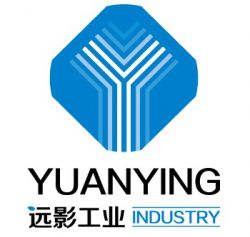 |
|
